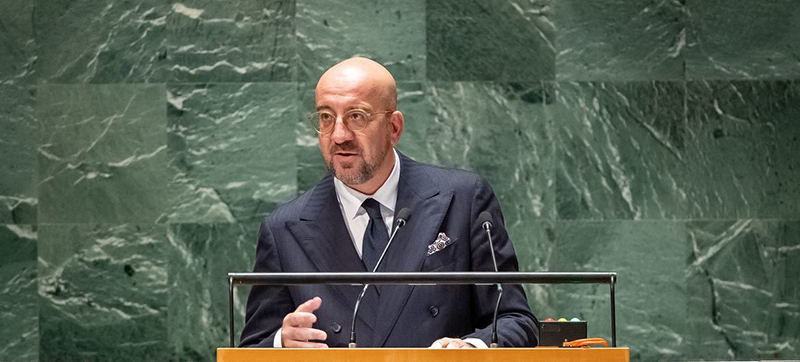European Council President says it’s time to put multilateralism back solid ground

The President of the European Council, Charles Michel, appealed on Thursday to the international community to protect the principles of the UN Charter, reform the Organization’s governance structures and double down on efforts to fight the climate crisis.
“Today, the United Nations system is sclerotic and hobbled by hostile forces. We must assume our responsibility. That means being engaged to put multilateral cooperation back on solid ground. For that, we need to: Restore trust. Resolve the most pressing problems. Repair the United Nations system.
Protecting the Charter
Trust and confidence between Member States is based on a faithful commitment to the principles outlined in the UN Charter, said Mr. Michel. Respect for national sovereignty, territorial integrity, and human rights are all fundamentally rooted in the agreements of the charter, he added.
The Russian invasion of Ukraine, however, has shamelessly disregarded the principles of the charter and damaged the legitimacy of the UN Security Council, claimed Mr. Michel.
“For the last 19 months a permanent member of the Security Council, Russia, without any shame, has been undertaking a war to conquer its neighbouring country which never threatened it in the past,” said Mr. Michel.
“We need to stop the Kremlin and its deadly adventure, but it has not been even slowed in its feeling of impunity.”
Mr. Michel criticized the Security Council’s veto policy, arguing that giving permanent members the right to veto sanctions against themselves “paralyzed” the council's ability to end conflict being perpetrated by one of its permanent members.
He also criticized the five-state makeup of the Security Council, arguing that larger and more diverse representation in the council would add to the council’s legitimacy.
“Due to its lack of representativeness, the Security Council is inexorably damaging its own legitimacy,” claimed Mr. Michel.
“The United Nations, as its name suggests, is a club of nations. When we contemplate reforming the multilateral system, we consider the nation state to be its basic unit. An increase in the number of permanent members of the Security Council is inevitable. We must move beyond this status quo,” he added.
Climate crisis
Mr. Michel also addressed climate in his delivery to the UNGA, remarking that “the world is boiling.”
“We have undertaken the collective to limit heating of the planet to 1.5 degrees, and yet we know that we are far from reaching that goal and the heating of our planet will achieve 2.5 degrees between now and the end of the century. We must get back on track.”
In response to the slow progress, the European Union (EU) independently raised its targets toward renewable energy.
“We are calling for a tripling of renewable energy targets, with the G20 following suit, and a doubling of energy efficiency targets by 2030,” said Mr. Michel.
He also emphasised the role of the EU in driving the international financing of climate action.
“The international community is expected to reach the $100 billion mark for the international financing of climate action. The European Union has been a driving force, providing $26 billion in 2021, more than its share,” he said.
“Natural disasters are unfolding at a dizzying pace on every continent, and most recently in Libya. Now more than ever, an international disaster fund is necessary to ensure rapid and fair assistance and strengthen our collective resilience.”
Reforming financial framework
Mr. Michel also encouraged the adoption of a robust and fair global financial framework that was “prepared for the 21 century.”
“The economic and financial situation of vulnerable economies has been seriously affected by the COVID-19 crisis and by Russia’s war in Ukraine. More than 50 low-income countries have defaulted on their debts, and a dozen others could follow suit,” he said.
“Whole regions of the world are deprived of access to financing, thereby not only hampering progress towards the sustainable development goals, but also increasing the risk of a debt crisis.”
Mr. Michel called for a “financial shake-up” and expressed his support for the Paris Summit for a New Global Financing Pact ‒ convened by the French President and the Prime Minister of Barbados. He argued the international community must “increase the lending capacity of international financial institutions as an essential safety net” for smaller, developing countries.



